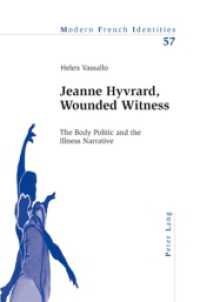- ホーム
- > 洋書
- > 英文書
- > Philosophy
基本説明
This volume reproduces Taylor's orginal article and other works on fatalism cited by Wallace in his critique. James Ryerson, an editor at the New York Times Magazine, draws parallels in his introduction between Wallace's philosophy and fiction.
Full Description
In 1962, the philosopher Richard Taylor used six commonly accepted presuppositions to imply that human beings have no control over the future. David Foster Wallace not only took issue with Taylor's method, which, according to him, scrambled the relations of logic, language, and the physical world, but also noted a semantic trick at the heart of Taylor's argument. Fate, Time, and Language presents Wallace's brilliant critique of Taylor's work. Written long before the publication of his fiction and essays, Wallace's thesis reveals his great skepticism of abstract thinking made to function as a negation of something more genuine and real. He was especially suspicious of certain paradigms of thought-the cerebral aestheticism of modernism, the clever gimmickry of postmodernism-that abandoned "the very old traditional human verities that have to do with spirituality and emotion and community." As Wallace rises to meet the challenge to free will presented by Taylor, we witness the developing perspective of this major novelist, along with his struggle to establish solid logical ground for his convictions. This volume, edited by Steven M.
Cahn and Maureen Eckert, reproduces Taylor's original article and other works on fatalism cited by Wallace. James Ryerson's introduction connects Wallace's early philosophical work to the themes and explorations of his later fiction, and Jay Garfield supplies a critical biographical epilogue.
Contents
Preface, by Steven M. Cahn and Maureen Eckert Introduction: A Head That Throbbed Heartlike: The Philosophical Mind of David Foster Wallace, by James Ryerson Part I: The Background Introduction, by Steven M. Cahn 1. Fatalism, by Richard Taylor 2. Professor Taylor on Fatalism, by John Turk Saunders 3. Fatalism and Ability, by Richard Taylor 4. Fatalism and Ability II, by Peter Makepeace 5. Fatalism and Linguistic Reform, by John Turk Saunders 6. Fatalism and Professor Taylor, by Bruce Aune 7. Taylor's Fatal Fallacy, by Raziel Abelson 8. A Note on Fatalism, by Richard Taylor 9. Tautology and Fatalism, by Richard Sharvy 10. Fatalistic Arguments, by Steven Cahn 11. Comment, by Richard Taylor 12. Fatalism and Ordinary Language, by John Turk Saunders 13. Fallacies in Taylor's "Fatalism," by Charles D. Brown Part II: The Essay 14. Renewing the Fatalist Conversation, by Maureen Eckert 15. Richard Taylor's "Fatalism" and the Semantics of Physical Modality, by David Foster Wallace Part III: Epilogue 16. David Foster Wallace as Student: A Memoir, by Jay Garfield Appendix: The Problem of Future Contingencies, by Richard Taylor








